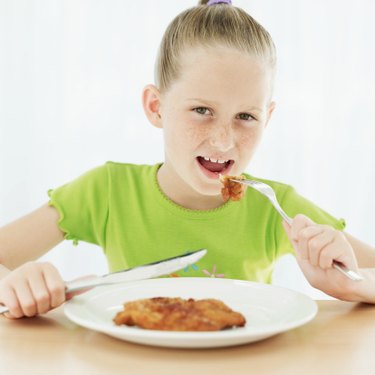
All children need the essential amino acid lysine, which aids the body in proper growth. The body does not make essential amino acids. Adults and children generally get amino acids from foods. Most children get enough lysine from food, but some children, such as those on a vegan diet who do not eat beans, may require a lysine supplement. Consult your doctor before giving lysine to your child; only your doctor can decide if the supplement is safe and beneficial for your child.
Benefits
Video of the Day
In addition to helping with growth, lysine helps in the production of carnitine, a nutrient responsible for converting fatty acids into energy and helping to lower cholesterol. Lysine helps produce collagen, and may also help the body absorb calcium, which children need for strong bones and teeth. If your child does not get enough lysine from her diet, she may experience fatigue, nausea, dizziness, loss of appetite, agitation, bloodshot eyes, slow growth, anemia or a reproductive disorder. While little first-hand research exists on the effects of lysine supplements for children, researchers at the NWFP Agricultural University in Peshawar, Pakistan demonstrated the benefits of adding lysine to wheat in a June 2004 "Food and Nutrition Bulletin" article. Children who ate wheat flour fortified with lysine had significantly greater increases in height and weight compared to the group of children who ate wheat flour without lysine.
Video of the Day
Foods
The best way to get lysine is through food, especially protein sources. While you can find lysine in a number of foods, the best protein sources include red meat, pork and poultry; Parmesan cheese; cod; sardines; nuts; eggs; tofu; isolated soy protein; defatted soybean flour; spirulina and fenugreek seed. Your child can also get lysine from beans, other legumes, dairy products and brewer's yeast.
Dose
Lysine comes in tablets, capsules and creams. In liquid form, manufacturers usually sell lysine as L-lysine. Children ages 2 to 12 can take 23 mg per kg body weight per day. More simply, children can take 10 mg per pound of body weight each day. Multiply 10 mg by your child's weight in pounds to get the correct dose. Children under 2 should not take lysine without a doctor's supervision. Children 13 and older can take the recommended adult dose of 12 mg per kg body weight per day. Check with your child's pediatrician first.
Possible Interactions
Lysine can interact with a number of drugs and supplements. Tell the doctor about all medications and supplements your child takes. Unless the doctor advises otherwise, generally, your child should not take lysine with gentamicin, amikacin, kanamycin, netilmicin, neomycin, netilmicin, streptomycin and tobramycin. If your child takes arginine, the arginine can lower lysine levels because the two share common pathways in the body.
Warnings
The Food and Drug Administration has not approved lysine for the treatment of any disease. The specific contents of a lysine supplement can vary from company to company, because no manufacturing standards exist for this supplement. A life-threatening overdose is unlikely, but your child may experience unwanted side effects. Call the doctor immediately if your child shows signs of a serious allergic reaction, including the throat closing, difficulty breathing, hives, or experiences swelling of the lips, tongue or face. Before giving your child lysine supplements, consult your child's pediatrician.